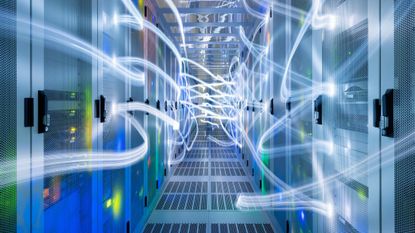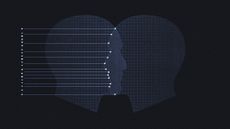What's dark data and why is it bad for the environment?
Data is being used and discarded, but still clogging servers


In a world of rapidly growing technology, data storing plays an important role in the lives of people and companies. "Data" can refer to anything from business information to photos taken on a cell phone. The problem: Much of this stored data is used only once before retreating to the archives, where it continues to take up space and resources.
What is dark data?
Dark data is digital data that is used once and then never again. "This could be your multiple near-identical images held on Google Photos or iCloud, a business's outdated spreadsheets that will never be used again, or data from the internet," including data from social media posts and memes, said Ian Hodgkinson and Tom Jackson, professors at Loughborough University who authored a policy briefing on the environmental impact of dark data, in a piece for The Conversation. "This accumulation requires extensive energy resources, meaning that data centers may consume more electricity than countries like the U.K."
Research has shown that close to 70% of data companies have dark data. People accumulate it in their everyday lives as well. "One picture isn't going to make a drastic impact. But of course, if you maybe go into your own phone and you look at all the legacy pictures that you have, cumulatively, that creates quite a big impression in terms of energy consumption," Hodgkinson said to The Guardian.
Subscribe to The Week
Escape your echo chamber. Get the facts behind the news, plus analysis from multiple perspectives.

Sign up for The Week's Free Newsletters
From our morning news briefing to a weekly Good News Newsletter, get the best of The Week delivered directly to your inbox.
From our morning news briefing to a weekly Good News Newsletter, get the best of The Week delivered directly to your inbox.
This data comes at a price. "When we're storing things in the cloud, we think about the white fluffy cloud, but the reality is, these data centers are incredibly hot, incredibly noisy, they consume a large amount of energy," said Hodgkinson. This translates to a significant carbon footprint.
Why is it bad for the environment?
Storing data requires an exorbitant amount of energy. The International Energy Agency predicts that data centers will require 1,000 terawatt hours of energy in 2026, which is roughly equivalent to the electricity consumption of Japan. "What governments have failed to look at so far is the carbon footprint of digitalization," Jackson said to Energy Monitor. "It is like the iceberg analogy: There are big polluters now that are at the top of the iceberg, but hidden beneath the surface are some big issues we are just not seeing yet."
Estimates of companies' greenhouse gas emissions are likely also being underrepresented. "In the drive towards net zero, many organizations are trying to reduce their carbon footprints," said The Conversation piece. "Guidance has generally centered on reducing traditional sources of carbon production through mechanisms such as carbon offsetting via third parties." Many companies are additionally not aware of the amount of emissions resulting from their data usage. "One thing a company can do is start looking at the process of how data is coming in and is reproduced, who is using that data, how much is stored and what the value of that data is to the business," Jackson said.
The build-up of dark data is an indication of inefficiency within the digital systems. "We are moving on to a society where we have 'plastic knowledge,'" said Jackson. "We go to a search engine, we roughly figure out what we wanted to know or how to do something, and then we discard that information. So, it is kind of like a plastic bag that you use once and then throw away." Addressing these inefficiencies and adding systems where knowledge can be shared rather than allowing data to be built up can also help decarbonize the world. This can even be done at an individual level, if you avoid "reply all" emails and delete duplicate photos.
Create an account with the same email registered to your subscription to unlock access.
Sign up for Today's Best Articles in your inbox
A free daily email with the biggest news stories of the day – and the best features from TheWeek.com
Devika Rao has worked as a staff writer at The Week since 2022, covering science, the environment, climate and business. She previously worked as a policy associate for a nonprofit organization advocating for environmental action from a business perspective.
-
 The week's best photos
The week's best photosA helping hand, a rare dolphin and more
By Anahi Valenzuela, The Week US Published
-
 Today's political cartoons - August 30, 2024
Today's political cartoons - August 30, 2024Cartoons Friday's cartoons - seasoned vets, football season, and more
By The Week US Published
-
 'Harris gains slim lead'
'Harris gains slim lead'Today's Newspapers A roundup of the headlines from the US front pages
By The Week Staff Published
-
 AI is cannibalizing itself. And creating more AI.
AI is cannibalizing itself. And creating more AI.The Explainer Artificial intelligence consumption is outpacing the data humans are creating
By Devika Rao, The Week US Published
-
 Yes, I miss the dotcom era
Yes, I miss the dotcom eraOpinion Things didn't go as planned, but technology can still unleash creativity
By Mark Gimein Published
-
 Will the Google antitrust ruling shake up the internet?
Will the Google antitrust ruling shake up the internet?Today's Big Question And what does that mean for users?
By Joel Mathis, The Week US Published
-
 Questions arise over the use of an AI crime-fighting tool
Questions arise over the use of an AI crime-fighting toolUnder the Radar The tool was used in part to send a man to prison for life
By Justin Klawans, The Week US Published
-
 Gen Z doesn't want cars
Gen Z doesn't want carsUnder the Radar Olivia Rodrigo may have been excited to get her driver's license, but many young people are less enthused by car culture
By Anya Jaremko-Greenwold, The Week US Published
-
 Threads turns one: where does the Twitter rival stand?
Threads turns one: where does the Twitter rival stand?In the Spotlight Although Threads is reporting 175 million active monthly users, it has failed to eclipse X as a meaningful cultural force
By Keumars Afifi-Sabet, The Week UK Published
-
 The war against AI bots is still really about privacy versus money
The war against AI bots is still really about privacy versus moneyThe explainer Is this the real life? Is this technology?
By Devika Rao, The Week US Published
-
 Why are facial recognition technology rules changing in Detroit?
Why are facial recognition technology rules changing in Detroit?Today's Big Question A wrongful arrest leads to a big settlement
By Joel Mathis, The Week US Published